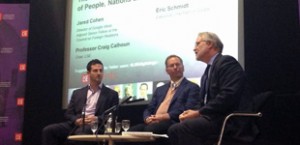
Eric Schmidt (Google Executive Chairman) and Jared Cohen (Director of Google Ideas) came to the LSE to present their new book: “The New Digital Age: Reshaping the Future of People, Nations and Business“
The school director, Craig Calhoun, was making comments and questions about some points from the book to finally allow students and other guests like myself to make them answer our doubts and concerns.
The chairman of Google said that each individual has several digital identities and act on them very differently to their real life. For example, many people know more people in the digital world than the ones they dare to meet in the physical world. Actually it’s like their behaviour, Why some behave so badly digitally?, wounding others when they wouldn’t do its physical equivalent, as could be hit someone.
About the files on the network he said: “It is impossible its control in real time. We wish we knew how to control and filter what gets on the network, either on Google, YouTube or any of the social networks, but it is impossible for the massive amount of information uploaded per second“
He highlighted examples of the speed of propagation of any online content, for example, someone tweets something, within three seconds they realise about the possible mistake and removes it. It doesn’t take three seconds, but one to be seen, reproduced and ineffaceable forever. “Any bad information on the net is indelible, whether a movie illegally, information, pictures… Although either police or ourselves put down a server, the information is duplicated in three more immediately“
He recalled a recent story of a boy who invented and designed the parts of a gun that can be printed on any 3D printer in any home. “That idea will kill many people. That was quickly removed from the network, but you will always be able to get it”.
“You have to be very careful on the internet, an error of an 11 year old girl can follow her the rest of her life“.
The digital age means transparency, for both, good or bad, that means, terrorists use smartphones and the internet, so they can always be found in advance. “Terrorists have three characteristics: They’re young, they’re bad and young people make mistakes. Terrorists will be pursued in real time and it will become increasingly difficult for them to act”.
Eric mentioned another example, this time about drug trafficking in the Philippines where police ask for the phone of people in traffic controls to identify both the driver and their connections through their mobile contacts to identify and combat drug trafficking, but when they get that, “all that people network and information belong to the government and we don’t know how that could be used.“
Some students asked about privacy in their search engine, when they explained that everyone is free to not allow “cookies” in their browsers. Then another question about the evasion of tax duties through their business address in Ireland, in which he defended that they do nothing illegal. Eric also had words for governments: “We are always happy to work with governments but I also think they should develop their own resources to protect the interests of citizens. Our philosophy is to make users happy and to get more every time”.
He compared Google transparency with governments and users, but he doesn’t see the same from governments, and that in the new digital age, everything becomes transparent to citizens.
You can listen to the entire conference in the podcast below:
Leave a Reply